Questões de Língua Inglesa do ano 2003
Lista completa de Questões de Língua Inglesa do ano 2003 para resolução totalmente grátis. Selecione os assuntos no filtro de questões e comece a resolver exercícios.
As questões de números 40 a 47 referem-se ao texto abaixo.
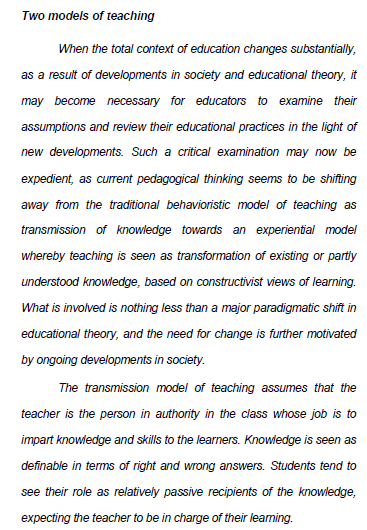
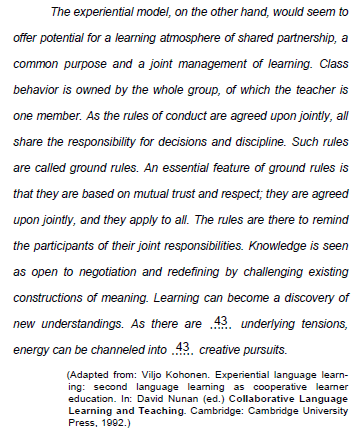
De acordo com o texto, as alterações em curso no pensamento pedagógico
- A.
apontam para uma mudança de paradigma importante na teoria educacional.
- B.
são o resultado da revisão crítica dos educadores sobre as suas práticas.
- C.
caminham na direção contrária aos desenvolvimentos na sociedade.
- D.
demandam das autoridades ligadas à educação mais rapidez nas ações em prol do ensino.
- E.
põem em xeque a impressão de continuidade entre os dois modelos de ensino.
As questões de números 40 a 47 referem-se ao texto abaixo.
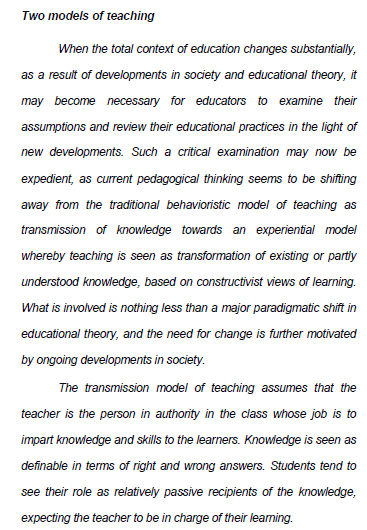
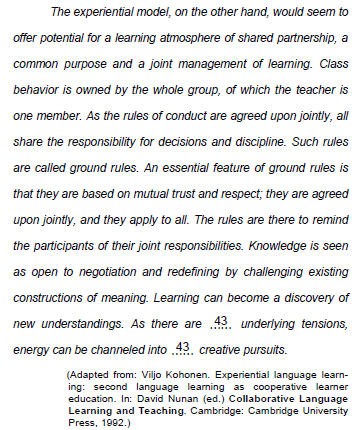
The rules are there to remind the participants of their joint responsibilities. No texto, essa frase refere-se ao fato de que, no modelo experimental,
- A.
os alunos são diretamente responsáveis por seu aprendizado.
- B.
tanto o professor quanto os alunos são responsáveis pelas decisões e pela disciplina em classe.
- C.
as regras de conduta nunca podem ser quebradas.
- D.
novas regras podem ser aplicadas em classe se o respeito e a confiança mútuos forem quebrados.
- E.
a responsabilidade dos alunos no cumprimento das regras de conduta precisa ser lembrada com freqüência.
As questões de números 40 a 47 referem-se ao texto abaixo.
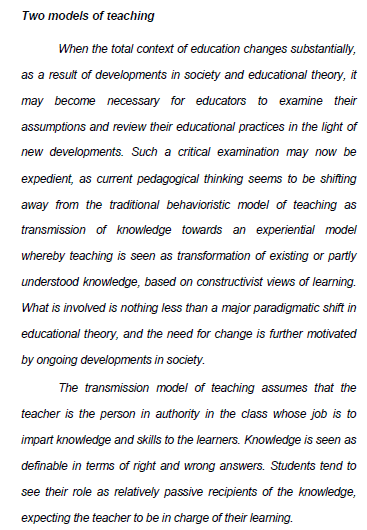
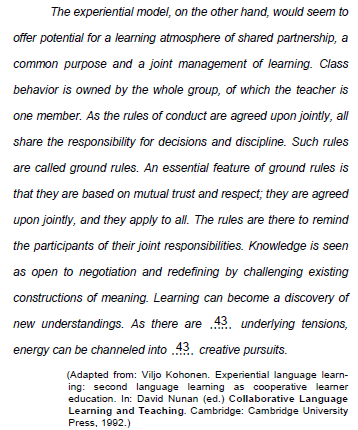
We can infer from the text that one of the differences between the transmission model and the experiential model of teaching is that
- A.
the latter tends to result in class indiscipline.
- B.
the former tends to be teacher-centred.
- C.
the transmission model presupposes a constructivist theory of learning.
- D.
in the experiential model knowledge is seen as predefinable.
- E.
in the transmission model there is greater development of learner skills.
As questões de números 48 a 50 referem-se ao texto abaixo.
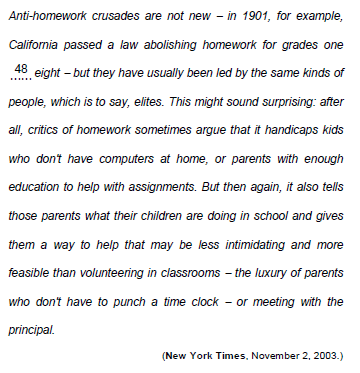
In the text, parents who don't have to punch a time clock means parents who
- A.
are not working class people.
- B.
are jobless.
- C.
work in a factory.
- D.
work at night.
- E.
are not illiterate.
As questões de números 48 a 50 referem-se ao texto abaixo.
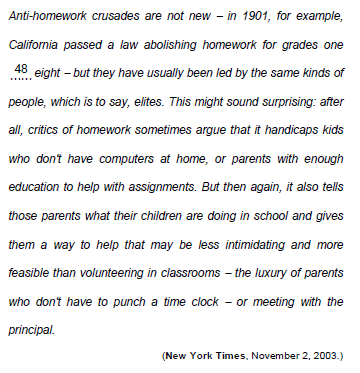
One could say that the text
- A.
makes a clear case for less homework.
- B.
advocates that every home should have a computer exclusively for the children to use.
- C.
praises parents who talk to the principal.
- D.
states that uneducated parents should not help their children with their homework.
- E.
makes a subtle criticism of the elite.
Read the following passage and choose the option that best answers the questions 01 to 05.
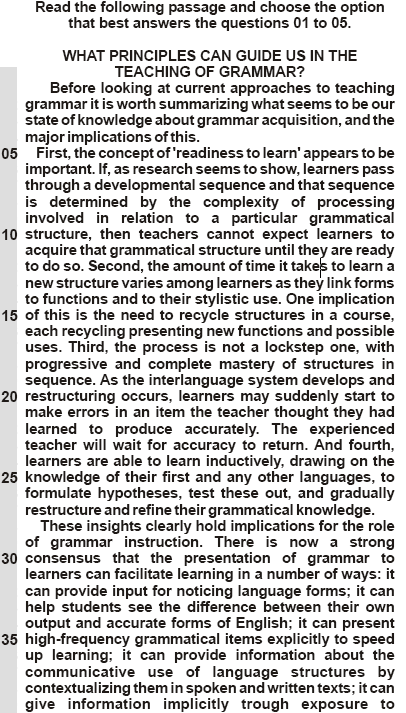

"The concept of 'readiness to learn'" (line 5) implies that:
- A.
teachers can expect learners to acquire a certain grammatical structure after being led through a developmental sequence;
- B.
teachers cannot expect learners to acquire a certain grammatical structure which is too complex;
- C.
learners need a particular amount of time to internalize a certain grammatical structure;
- D.
as the learner's interlanguage develops, he will master structures in sequence;
- E.
learners go through a complex process of developing a certain grammatical structure.
Jeremy Harmer in his book The Practice of English Language Teaching says:
"Developmental errors: for a long time now researchers in child language development have been aware of the phenomenon of 'over-generalisation'. This is best described as a situation where a child who starts by saying Daddy went, They came, etc. perfectly correctly suddenly starts saying *Daddy goed and *They comed. (...) Foreign language students make the same kind of 'developmental' errors as well". (p. 100). We can infer that:
- A. such errors as "she is more nicer than him" are part of a natural acquisition process among foreign learners;
- B.
mistakes are subconsciously learnt and it is very difficult for a teacher to correct them;
- C.
when responding to errors, teachers should be seen as telling students off because they are wrong;
- D.
when second language learners make errors, they are demonstrating their difficulty in acquiring that language;
- E.
adults acquire a second language more easily than children because they are aware of grammar rules.
As far as motivation is concerned, Jeremy Harmer says that:
"At its most basic level, motivation is some kind of internal drive which pushes someone to do things in order to achieve something. As H Douglas Brown points out, a cognitive view of motivation includes factors such as the need for exploration, activity, stimulation, new knowledge, and ego enhancement (Brown 2000: 160-166). (...)
Marion Williams and Richard Burden suggest that motivation is a 'state of cognitive arousal' which provokes a 'decision to act' as a result of which there is 'sustained intellectual and/or physical effort' so that the person can achieve some 'previously set goal' (Williams and Burden 1997: 120). They go on to point out that the strength of that motivation will depend on how much value the individual places on the outcome he or she wishes to achieve". We can infer that:
- A.
motivation is caused not only by a number of internal factors, such as the desire of feeling better but also by amorphous powerless goals;
- B.
most researchers have come to view that motivation is ultimately the reason why learners hardly ever come to master a foreign language;
- C.
the adult who starts going to a gym may hope that a new body image will aid ego enhancement and be stimulated by the active nature of this new undertaking;
- D.
in discussion of motivation an accepted distinction is made between extrinsic motivation and intrinsic motivation, that is motivation which comes respectively from inside and from outside;
- E.
at the beginning of any course, with students at whatever level and whatever age, the teacher is faced with students who have all a strong motivation.
Douglas Brown in his book Principles of Language Learning and Teaching says that: " The Input Hypothesis, a major offshoot of Krashen's Monitor Model, claims that an important "condition for language acquisition to occur is that the acquirer understand (via hearing or reading) input language that contains structure 'a bit beyond' his or her current level of competence (1981a:100). (...) An important part of the Input Hypothesis is Krashen's recommendation that speaking not be taught directly or very soon in the language classroom. Speech will "emerge" once the acquirer has built up enough comprehensible input. Krashen further claims that the best acquisition will occur in environments where anxiety is low and defensiveness is absent". (p.280) We can infer that:
- A.
adults learn faster than children because they "affective filter" is lower than the children's one;
- B.
second language learning clearly is a process in which speaking is the ultimate goal since the very beginning of the process;
- C.
Krashen's theories have been criticized because they have little to do with the Monitor Model;
- D.
if an acquirer is at stage or level i, the input he or she understands should contain i + 1;
- E.
Krashen believes that input should be so far beyond the acquirer's reach that he or she is overwhelmed.
Jeremy Harmer says that: "
The use of videotapes has been a common feature in language teaching for many years(...). To some people videotape is merely a glorified version of audiotape (...). But there are many reasons why video can add a special, extra dimension to the learning experience (...). One of the main advantages of video is that students do not just hear language, they see it too. Thus we can observe how intonation can match facial expression (...). Video uniquely allows students a look at situations far beyond their classrooms. This is especially useful if they want to see, for example, typical British 'body language' when inviting someone out (...)". (p.282). The best alternative is:
- A.
Videos are not essential in the classroom as they are "merely a glorified version of audiotape, and the use of video in class is just listening 'with pictures'.
- B.
Paralinguistic features, such as intonation, make it difficult for the learner to deeply interpret texts.
- C.
The use of video activities has just been implemented in the classroom.
- D.
When showing a video, it is not important to call the student's attention to cultural behaviour.
- E.
Showing videos in class is particularly important if the teacher wants to raise his/her students' cross-cultural awareness to things such as 'the body language' used by native speakers.


